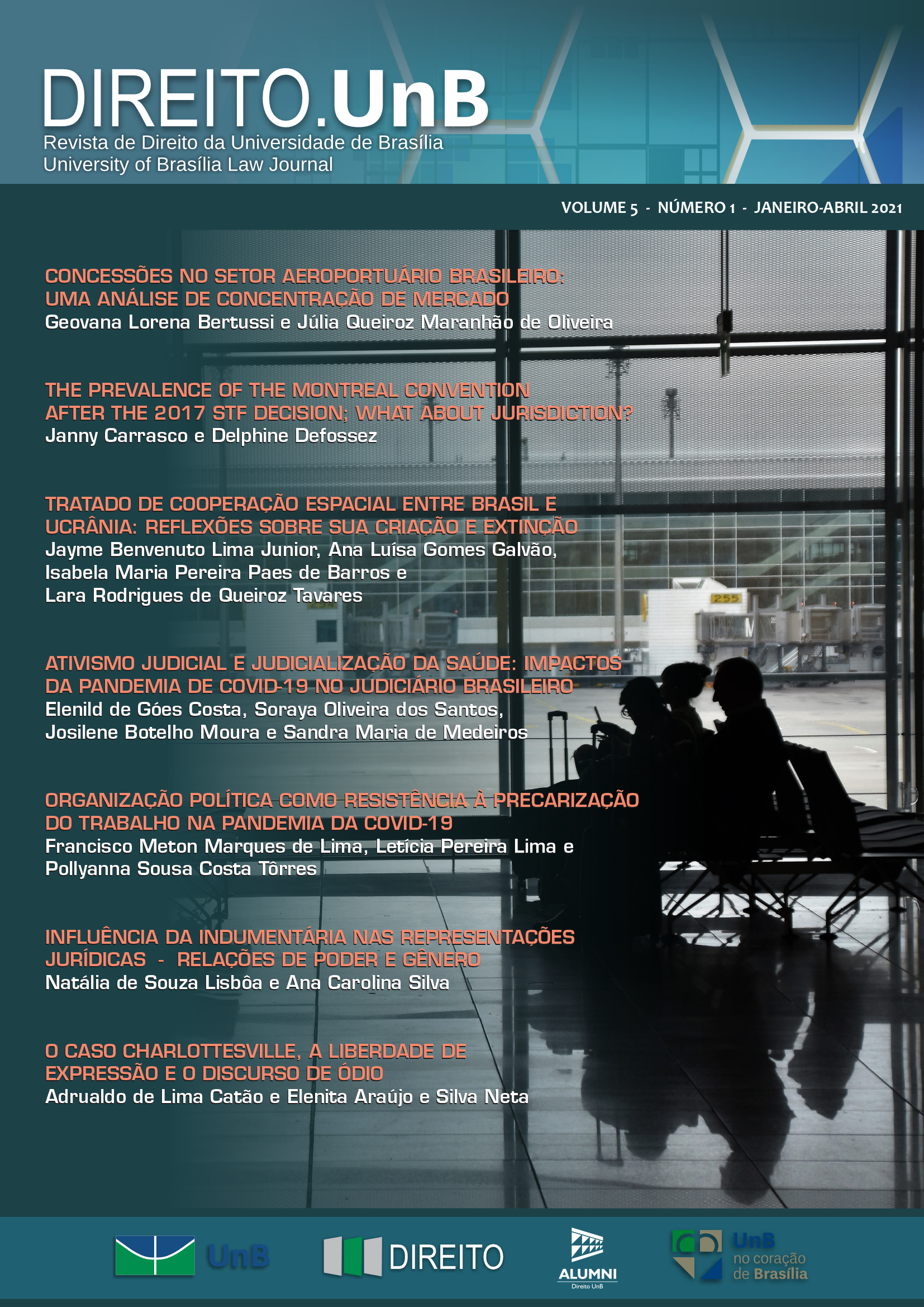POLITICAL ORGANIZATION AS RESISTANCE TO PRECARIOUSNESS OF WORK IN THE COVID-19 PANDEMIC
Keywords:
efeitos da pandemia , precarização do trabalho, legalização da precariedade , uberização do trabalho, solidariedade de classeAbstract
To contain the pandemic effects of COVID-19, the World Health Organization (WHO) recommended measures such as distance and social isolation. These measures caused a considerable decrease not only in the circulation of people, but also in consumption and economic activity. Despite the centrality of labor, in capitalist societies, labor is always seen as an expendable cost in favor of the profits of capital. As an expression of this, Provisional Measures 927 and 936 were issued during the pandemic, which allow the suspension of the employment contract, an increase in the number of hours for health workers and a reduction in the number of hours and wages for professionals in other sectors. Such measures legalize precariousness in the formal labor market and can be a test for more fragile labor contracts. One of the facets of precarious working conditions and relationships is also deregulation, through uberization of work, which imposes the overexploitation of human work through applications that connect the driver or delivery person to consumers who request a private transport or delivery service. of food and goods. In the pandemic, workers by application, in addition to not having the right to distance and / or social isolation according to WHO recommendations, did not receive, in their breadth as a category, protective equipment against the new coronavirus (face masks and alcohol gel, for example). In response to the terrible working conditions, we have two examples: the global strike of drivers on 5/8/2019 and the national stoppage of delivery people on 7/1/2020. These initiatives represent a resistance to the precariousness and uberization of work through political organization, unity and class solidarity.
Downloads
References
ABILIO, Ludmila Costhek. Uberização: do empreendedorismo para o autogerenciamento subordinado. Psicoperspectivas, v. 18, n. 3, p. 1-11, nov./2019.
ANTUNES, Ricardo. O privilégio da servidão: o novo proletariado de serviços na era digital. São Paulo: Boitempo, 2018.
BRASIL. Constituição (1988). Constituição da República Federativa do Brasil. Disponível em: http://www.planalto.gov.br/ccivil_03/constituicao/constituicao.htm. Acesso em: 21 mar 2020.
BRASIL. Decreto-Lei nº 5.452 (1943). Decreto-Lei nº 5.452, de 1º de maio de 1943. Disponível em: http://www.planalto.gov.br/ccivil_03/decreto-lei/del5452.htm. Acesso em: 10 mar 2020.
DELGADO, Gabriela Neves. Direito fundamental ao trabalho digno. 2. ed. São Paulo: LTr, 2015.
DELGADO, Mauricio Godinho. Curso de Direito do Trabalho. 18. ed. São Paulo: LTr, 2019.
DRUCK, Graça; FRANCO, Tânia (orgs.). A perda da razão social do trabalho: terceirização e precarização. São Paulo: Boitempo, 2016
FERREIRA, António Casimiro. Sociedade da Austeridade e direito do trabalho de exceção. Porto: Vida Económica, 2012.
LEME, Ana Carolina Reis Paiva. Tecnologias disruptivas e a exploração do trabalho humano. São Paulo: LTr, 2017.
LIMA, Francisco Meton Marques de; LIMA, Francisco Péricles Rodrigues Marques de. Elementos de Direito do Trabalho e Processo Trabalhista. 16. ed. LTr: São Paulo, 2016.
OITAVEN, Juliana Carreiro Corbal; CARELLI, Rodrigo de Lacerda; CASAGRANDE, Cássio Luís. Empresas de transporte, plataformas digitais e a relação de emprego: um estudo do trabalho subordinado sob aplicativos. Brasília: Ministério Público do Trabalho, 2018.
RIEMENSCHNEIDER, Patrícia Strauss; MUCELIN, Guilherme Antônio. Economia do compartilhamento: a lógica algorítmica das plataformas virtuais e a necessidade de proteção da pessoa nas atuais relações de trabalho. Redes: Revista Eletrônica Direito e Sociedade, v. 7, n. 1, p. 61-93, abr./2019.
SLEE, Tom. Uberização: a nova onda do trabalho precarizado. São Paulo: Editora Elefante, 2017.
STANDING, Guy. Precariado: a nova classe perigosa. Belo Horizonte: Autêntica Editora, 2014.

Downloads
Published
How to Cite
Issue
Section
License
Copyright (c) 2021 Direito.UnB - Law Journal of the University of Brasília

This work is licensed under a Creative Commons Attribution-NonCommercial-NoDerivatives 4.0 International License.
Autores que publicam na Revista Direito.UnB concordam com os seguintes termos:
- Autores mantêm os direitos autorais e concedem à revista o direito de primeira publicação, com o trabalho simultaneamente licenciado sob a Licença Creative Commons - Atribuição-NãoComercial-SemDerivações 4.0 Internacional que permite o compartilhamento do trabalho com reconhecimento da autoria e publicação inicial nesta revista.
- Autores têm autorização para assumir contratos adicionais separadamente, para distribuição não-exclusiva da versão do trabalho publicada na Revista Direito.UnB (ex.: publicar em repositório institucional ou como capítulo de livro), com reconhecimento de autoria e publicação inicial nesta revista.
- Autores têm permissão e são incentivados a publicar e distribuir seu trabalho online (ex.: em repositórios institucionais ou em suas páginas pessoais) a qualquer momento após à definição do processo editorial.
- Autores concordam que, eventualmente, seus trabalhos poderão ser agregados pela Revista Direito.UnB às bases e sistemas de informação científica existentes (indexadores e bancos de dados atuais) ou que existam no futuro (indexadores e bancos de dados futuros). Os detentores dessas bases de dados terão a possibilidade de realizar as seguintes ações sobre o artigo:
- Reproduzir, transmitir e distribuir o artigo, no todo ou em parte sob qualquer forma ou meio de transmissão eletrônica existente ou desenvolvida no futuro, incluindo a transmissão eletrônica para fins de pesquisa, visualização e impressão;
- Reproduzir e distribuir, no todo ou em parte, o artigo na impressão;
- Capacidade de traduzir certas partes do artigo;
- Extrair figuras, tabelas, ilustrações e outros objetos gráficos e capturar metadados, legendas e artigo relacionado para fins de pesquisa, visualização e impressão;
- Transmissão, distribuição e reprodução por agentes ou autorizada pelos proprietários de distribuidoras de bases de dados;
- A preparação de citações bibliográficas, sumários e índices e referências de captura relacionados de partes selecionadas do artigo;
- Digitalizar e/ou armazenar imagens e texto de artigo eletrônico.





